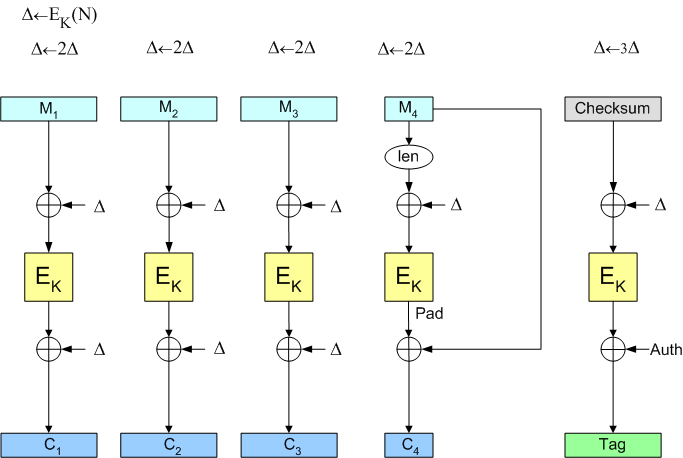1
2
3
4
5
6
7
8
9
10
11
12
13
14
15
16
17
18
19
20
21
22
23
24
25
26
27
28
29
30
31
32
33
34
35
36
37
38
39
40
41
42
43
44
45
46
47
48
49
50
51
52
53
54
55
56
57
58
59
60
61
62
63
64
65
66
67
68
69
70
71
72
73
74
75
76
77
78
79
80
81
82
83
84
85
86
87
88
89
90
91
92
93
94
95
96
97
98
99
100
101
102
103
104
105
106
107
108
109
110
111
112
113
114
115
116
117
118
119
120
121
122
123
124
125
126
127
128
129
130
131
132
133
134
135
136
137
138
139
140
141
142
143
144
145
146
147
148
149
150
151
152
153
154
155
156
157
158
159
160
161
162
163
164
165
166
167
168
169
170
171
172
173
174
175
176
177
178
179
180
181
182
183
184
185
186
187
188
189
190
191
192
193
194
195
196
197
198
199
| from pwn import*
from hashlib import*
import string
from Crypto.Util.number import*
from gmpy2 import*
import os
import math
strr= string.ascii_letters+string.digits
def times2(input_data,blocksize = 16):
assert len(input_data) == blocksize
output = bytearray(blocksize)
carry = input_data[0] >> 7
for i in range(len(input_data) - 1):
output[i] = ((input_data[i] << 1) | (input_data[i + 1] >> 7)) % 256
output[-1] = ((input_data[-1] << 1) ^ (carry * 0x87)) % 256
assert len(output) == blocksize
return output
def times3(input_data):
assert len(input_data) == 16
output = times2(input_data)
output = xor_block(output, input_data)
assert len(output) == 16
return output
def back_times2(output_data,blocksize = 16):
assert len(output_data) == blocksize
input_data = bytearray(blocksize)
carry = output_data[-1] & 1
for i in range(len(output_data) - 1,0,-1):
input_data[i] = (output_data[i] >> 1) | ((output_data[i-1] % 2) << 7)
input_data[0] = (carry << 7) | (output_data[0] >> 1)
if(carry):
input_data[-1] = ((output_data[-1] ^ (carry * 0x87)) >> 1) | ((output_data[-2] % 2) << 7)
assert len(input_data) == blocksize
return input_data
def xor_block(input1, input2):
assert len(input1) == len(input2)
output = bytearray()
for i in range(len(input1)):
output.append(input1[i] ^ input2[i])
return output
def hex_to_bytes(input):
return bytearray(long_to_bytes(int(input,16)))
def pow():
p.recvuntil("XXXX+")
str1 = str(p.recvuntil(")")[:-1],encoding='utf-8')
p . recvuntil("= ")
sha = p.recvuntil("\n")[:-1]
for i in strr:
for j in strr:
for k in strr:
for m in strr:
s = sha256((i+j+k+m+str1).encode()).hexdigest()
if s == str(sha,encoding='utf-8'):
p.recvuntil("XXXX:")
p.sendline(i+j+k+m)
return 1
def giveusername():
p.recvuntil("> ")
p.sendline('014')
def get_encrypt(msg):
nonce = bytearray(os.urandom(16))
p.recvuntil("Enter option > ")
p.sendline ("1")
p.recvuntil("Enter nonce > ")
p.sendline (nonce.hex())
p.recvuntil("Enter message > ")
fake_m = bytearray(b'\x00'*15+b'\x80'+b'\x00'*16)
p.sendline(fake_m.hex())
p.recvuntil("ciphertext: ")
ciphertext = p.recvuntil("\n")[:-1]
p.recvuntil("tag: ")
tag = p.recvuntil("\n")[:-1]
p.recvuntil("Enter option > ")
p.sendline ("2")
p.recvuntil("Enter nonce > ")
p.sendline (nonce.hex())
p.recvuntil("Enter ciphertext > ")
m0 = bytearray(b'\x00'*15+b'\x80')
m1 = bytearray(b'\x00'*16)
c0 = hex_to_bytes(ciphertext[:32])
p.sendline (xor_block(c0,m0).hex())
p.recvuntil("tag > ")
c1 = ciphertext[32:]
p.sendline (c1)
p.recvuntil("data > ")
p.sendline ("")
p.recvuntil("message: ")
enc = xor_block(bytearray(hex_to_bytes(p.recvuntil("\n")[:-1])),m0)
A = back_times2(enc)
B = enc
C = xor_block(B,c0)
msg = bytearray(msg)
p.recvuntil("option > ")
p.sendline ("1")
p.recvuntil("nonce > ")
p.sendline (xor_block(B,m0).hex())
p.recvuntil("message > ")
p.sendline (xor_block(msg,times2(C)).hex()+m1.hex())
p.recvuntil("ciphertext: ")
enc = bytearray(hex_to_bytes(p.recvuntil("\n")[:-1])[:16])
p.recvline()
return xor_block(enc,times2(C))
def my_pmac(header, blocksize = 16):
assert len(header)
m = int(max(1, math.ceil(len(header) / float(blocksize))))
offset = get_encrypt(bytearray([0] * blocksize))
offset = times3(offset)
offset = times3(offset)
checksum = bytearray(blocksize)
for i in range(m - 1):
offset = times2(offset)
H_i = header[(i * blocksize):(i * blocksize) + blocksize]
assert len(H_i) == blocksize
xoffset = xor_block(H_i, offset)
encrypted = get_encrypt(xoffset)
checksum = xor_block(checksum, encrypted)
offset = times2(offset)
H_m = header[((m - 1) * blocksize):]
assert len(H_m) <= blocksize
if len(H_m) == blocksize:
offset = times3(offset)
checksum = xor_block(checksum, H_m)
else:
H_m.append(int('10000000', 2))
while len(H_m) < blocksize:
H_m.append(0)
assert len(H_m) == blocksize
checksum = xor_block(checksum, H_m)
offset = times3(offset)
offset = times3(offset)
final_xor = xor_block(offset, checksum)
auth = get_encrypt(final_xor)
return auth
def my_ocb_encrypt(plaintext, header, nonce, blocksize = 16):
assert nonce
m = int(max(1, math.ceil(len(plaintext) / float(blocksize))))
offset = get_encrypt(nonce)
checksum = bytearray(blocksize)
ciphertext = bytearray()
for i in range(m - 1):
offset = times2(offset)
M_i = plaintext[(i * blocksize):(i * blocksize) + blocksize]
assert len(M_i) == blocksize
checksum = xor_block(checksum, M_i)
xoffset = get_encrypt(xor_block(M_i, offset))
ciphertext += xor_block(offset, xoffset)
assert len(ciphertext) % blocksize == 0
M_m = plaintext[((m - 1) * blocksize):]
offset = times2(offset)
bitlength = len(M_m) * 8
assert bitlength <= blocksize * 8
tmp = bytearray(blocksize)
tmp[-1] = bitlength
pad = get_encrypt(xor_block(tmp, offset))
tmp = bytearray()
C_m = xor_block(M_m, pad[:len(M_m)])
ciphertext += C_m
tmp = M_m + pad[len(M_m):]
assert len(tmp) == blocksize
checksum = xor_block(tmp, checksum)
offset = times3(offset)
tag = get_encrypt(xor_block(checksum, offset))
if len(header) > 0:
tag = xor_block(tag, my_pmac(header))
return (tag, ciphertext)
def last_io():
p.recvuntil("option > ")
p.sendline("3")
p.recvuntil("nonce > ")
p.sendline(lastnonce.hex())
p.recvuntil("ciphertext > ")
p.sendline(lastcipher)
p.recvuntil("tag > ")
p.sendline(lasttag)
flag = p.recvuntil("}")
print(flag)
p.close()
if __name__ == "__main__":
p = remote("127.0.0.1",10007)
pow()
giveusername()
lastnonce = bytearray(hex_to_bytes('55'*16))
lasttag,lastcipher = (my_ocb_encrypt(bytearray(b'please_give_me_the_flag'),bytearray(b'from Alice'),lastnonce))
lasttag = lasttag.hex()
lastcipher = lastcipher.hex()
last_io()
|
